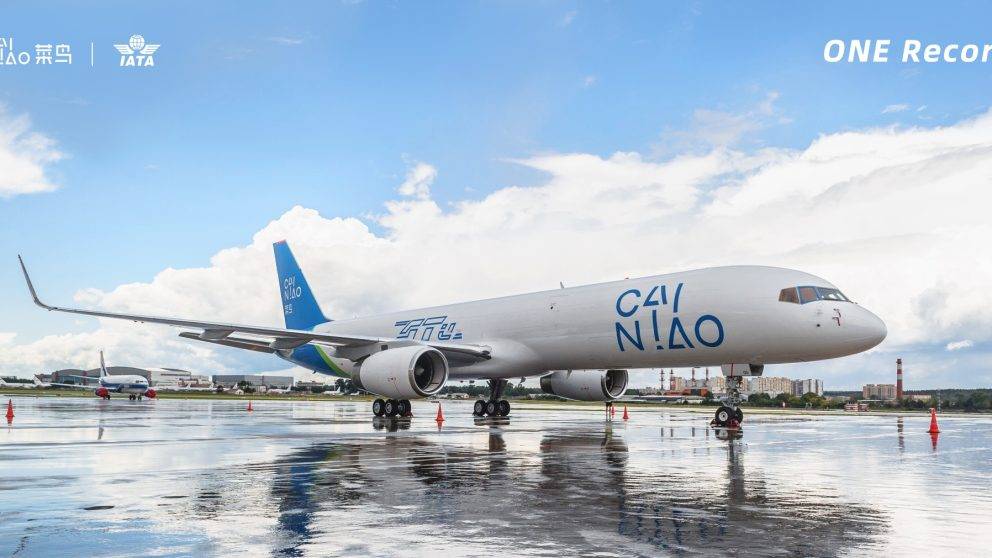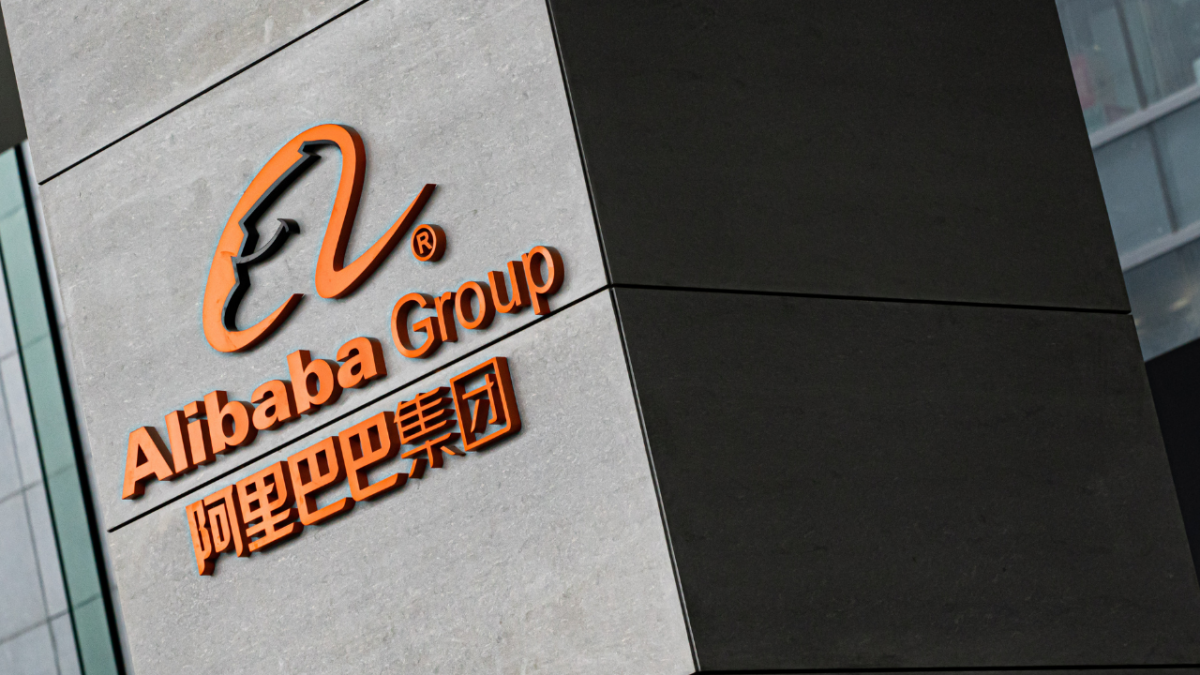


Alibaba's Hangzhou headquarters during 11.11 shopping festival. Photo credit: Alibaba Group
Alibaba Group said on Thursday it would enlarge its stock repurchase program by $15 billion and extend it until the end of March 2025, showing commitment to improving shareholder returns.
The platform company’s second-quarter core earnings beat stock analysts’ forecasts as it tightened cost controls and delivered revenue growth despite a challenging economic backdrop. The shares closed 7.8% higher on Wall Street.
Alibaba’s adjusted EBITDA, a non-GAAP measurement, jumped 24% year-over-year to RMB43.31 billion ($6.09 billion) for the quarter that ended Sept. 30, above consensus predictions of about RMB38 billion compiled by Thomson and separately by Bloomberg.
“We delivered solid results this past quarter despite ongoing macro environment challenges, which is a testament to our resilient business model and unmatched customer value proposition,” said Daniel Zhang, Alibaba’s Chairman and Chief Executive Officer in a statement.
China’s retail sector has been grappling with spikes in COVID-19 cases this year that have prompted rolling lockdowns, supply-chain bottlenecks and dampened consumer sentiment, said sector analysts.
China’s total retail sales of social consumer goods between January and September eked out a gain of 0.7% year-on-year, according to the country’s National Bureau of Statistics. Meanwhile, per capita disposable income and consumption expenditure nationwide over the same period registered a real increase of 3.2% and 1.5% year-on-year respectively.
Alibaba’s quarterly revenue rose 3% year-over-year to RMB207.18 billion against this backdrop. Its China commerce retail business’s customer management revenue (CMR), mainly marketing services and commissions, fell 7% year-over-year.
Looking ahead, stock analysts said Alibaba stands to benefit from China’s recovery.
“We consider it is in a sweet spot to embrace the reopening story ahead, thanks to its huge and engaging user base with the pursuit of successful customer segmentation strategies coupled with wide product selections,” said analysts at Jefferies including Thomas Chong in a report to investors.
On a call with analysts, management took a confident tone.
“We have taken note of the latest adjustments in China’s COVID-related policies and the proactive commentary from relevant government regulators about promoting the digital economy and high-quality development of platform businesses,” said Zhang.



Gross merchandise value (GMV) generated on digital marketplaces Taobao and Tmall dipped by a low-single-digit year-over-year, mainly due to soft consumption demand, the pandemic as well as ongoing competition.
This quarter, the drop in CMR was bigger than the decline in overall GMV because shoppers returned more purchases as COVID-restrictions impeded deliveries, livestreaming commerce tends to have a higher return rate and making a return became easier. Alibaba’s CMR take-rate calculation does not account for order returns.
Additionally, page views from algorithm-driven discovery recommendations grew, but Alibaba’s monetization of traffic was less efficient, resulting in a lower take rate in the short term.
“Looking forward, we will adapt to the changes in our user traffic composition and introduce better monetization products to ensure the long-term stability of our platform take rate,” Alibaba’s Zhang told analysts on a conference call.
We delivered solid results this past quarter despite ongoing macro environment challenges
Share Buyback
Alibaba said its board of directors had approved an increase in the group’s existing share repurchase program by $15 billion and extended the program through the end of March 2025.
The price of Alibaba’s American Depositary Receipts has fallen roughly a third in the year to date. According to Bloomberg’s data as of Thursday, 91% of analysts have a “buy” rating on Alibaba and 2% have a “sell” rating.
“The trust of our shareholders has enabled Alibaba’s development over the past 23 years, and we are committed to improving shareholder return,” said Alibaba’s Zhang.
As its shares have slipped lower, Alibaba has ramped up its buyback program. Earlier this year in March, Alibaba said it would hike its share repurchase program to $25 billion from $15 billion, running for two years through March 2024.
As of Nov. 16, Alibaba has repurchased about $18 billion worth of its shares under its existing $25 billion program.
Free cash flow, a non-GAAP measurement of liquidity, was RMB35.71 billion, up 61% compared with RMB22.24 billion in the same quarter of 2021.
“We believe Alibaba did everything it could to create shareholder value in
the current macro conditions,” said analysts including Alex Yao at JP Morgan when they handed a report card to investors. “We think the Street may lift earnings forecasts due to the company’s greater-than-expected cost control efforts,” they added.
Sculpting Operations
More disciplined spending helped narrow losses at business units Ele.me, Taobao Deals, Taocaicai, Lazada, Freshippo and Youku. Cost control also bolstered margins at the company’s biggest revenue engine, China Commerce.
Alibaba’s quarterly non-GAAP net income climbed 19% year-over-year to RMB33.82 billion, a metric that excludes the impact of fluctuations in the fair value of investments. Non-GAAP diluted earnings per ADS was RMB12.92, up 15% year-over-year and higher than the Thomson consensus forecast of about RMB11.62 and the Bloomberg consensus forecast of about RMB11.21.
Alibaba’s China commerce segment, including retail and wholesale operations, generated quarterly revenue of RMB135.43 billion, down 1% year-over-year. Reduced losses at Taobao Deals and Taocaicai helped boost the segment’s adjusted EBITA margin to 32% in the quarter from 30% a year earlier.
An efficiency drive gathered pace across the ecosystem. During the quarter, value-for-money platform Taobao Deals, retail chain Freshippo, and Taocaicai, which offers consumers a next-day pick-up service for groceries and fresh goods in their neighborhoods, all significantly narrowed losses year-over-year.
In Southeast Asia, e-commerce platform Lazada continued to improve its monetization rate by offering more value-added services and enhancing operating efficiency. During the quarter, Lazada’s losses per order narrowed by over a quarter compared with the same period last year.
Delivery platform Ele.me’s unit economics per order continued to be positive as its average order value increased year-over-year, user acquisition spending optimized and delivery cost per order fell.
Platform magic also created a virtuous circle of support for some businesses. During the quarter, Taocaicai for instance, continued to drive fresh produce category penetration on Alibaba’s China retail marketplaces, and the percentage of Taocaicai orders generated through Taobao and Taobao Deals’ apps continued to grow year-over-year.
Building Loyalty
The 11.11 Global Shopping Festival, routinely the world’s largest retail event according to industry analysts, showcased how consumer behavior is evolving in China. Rather than targeting a spike in gross merchandise value through heavy discounts, consultants are advising brands to take a longer-term approach that builds customer loyalty.
“We need to start engaging with our loyal customers…The more you shop with Fortnum’s, the more benefits or more experiences that you can encounter with the brand,” Carmen Chui, Regional Managing Director Asia Pacific at British luxury grocer Fortnum & Mason told Alizila during the festival.
Digital marketplaces Taobao and Tmall continued to attract and retain a cohort of big spenders. For the twelve months that ended Sept. 30 the number of consumers who each spent over RMB10,000 on Taobao and Tmall was around 124 million, with a retention rate of 98%.



Alibaba has deployed trains, planes and automobiles to surmount supply-chain hurdles and endeavor to satisfy customers during the pandemic. In one example, the group’s logistics arm, Cainiao, started operating two new international sorting centers in October, bumping up the total number operating overseas to 12.
In China, Cainiao expanded Cainiao Post, a network of neighborhood, campus and rural village stations and residential self-pick-up lockers, complementing the China commerce businesses. During the quarter, the number of Cainiao Posts grew by over 20% year-over-year to more than 170,000.
Cainiao’s revenue, after stripping out internal clients, grew 36% year-over-year to RMB13.37 billion. The segment registered a quarterly adjusted EBITA of RMB125 million, compared to a loss of RMB315 million a year earlier.
Local consumer services quarterly order volume grew by 5% year-over-year mainly driven by the strong order growth at Amap, which provides mobile digital map, navigation and real-time traffic information in China. During the week-long National Day holiday in October, Amap’s daily active users hit a record high of over 220 million in China.
Alibaba’s cloud segment, comprising cloud services business Alibaba Cloud and workplace collaboration platform DingTalk, grew quarterly revenue 4% year-over-year, after stripping out internal clients, to RMB20.76 billion mainly driven by healthy public cloud growth that was partially offset by declining hybrid cloud revenue.
Looking ahead, Alibaba Cloud will leverage its proprietary cloud computing and big data processing capabilities to launch a range of industry solutions with relevant partners for advancing China’s industrial digitalization.
“We believe Alibaba can play an important role in the digitalization process in China and around the world,” said Zhang on the call with analysts.
Additional reporting by Elizabeth Utley
This article has been updated to reflect share price reaction and stock analysts’ comments
To understand how Alibaba’s restructuring impacts Alibaba’s share buyback click here





